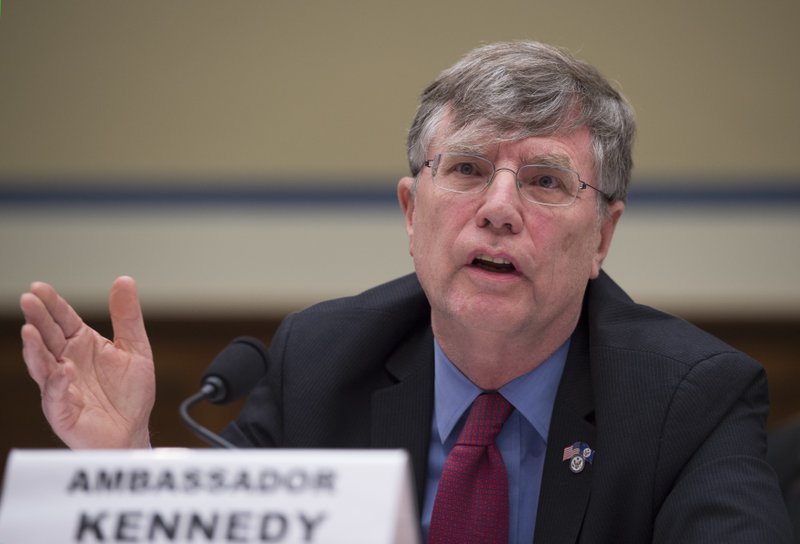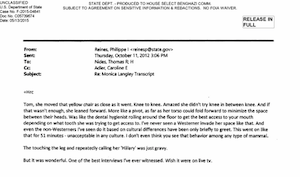WASHINGTON -- A now-retired FBI agent and a State Department official involved in a discussion last year over the classification of information in one of former Secretary of State Hillary Clinton's emails said Tuesday that they had discussed mutual agency requests but had not linked the two as a bargain, as another FBI employee had reported.
RELATED ARTICLES
http://www.arkansas…">Obama calls vote-rigging talk 'whining' http://www.arkansas…">Rigged-race talk puts states' focus on poll security
The two men's accounts of the 2015 conversation were not identical. They come alongside the claim that the State Department was trying to arrange a "quid pro quo" to reduce the classification of an email from Clinton's private server in exchange for more FBI positions at the U.S. Embassy in Iraq.
The issue was thrust into the presidential campaign Monday when the FBI published documents containing the claim.
In a statement released by the State Department, Under Secretary for Management Patrick Kennedy said he had called the agent, who was not named in the FBI documents but was identified by The Washington Post as Brian McCauley, "to better understand a proposal the FBI had made to upgrade one of former Secretary Clinton's emails prior to its public release."
[INTERACTIVE: 2016 election coverage]
Kennedy said he and other State Department officials wanted an explanation of the upgrade, which they believed was unnecessary.
"The FBI official I spoke to raised the topic of FBI Iraq slots as an entirely separate matter," Kennedy said. "The two matters were not linked. There was no quid pro quo, nor was there any bargaining. At no point in our conversation was I under the impression we were bargaining. In the end, State upgraded the email at the FBI's request and in addition, no increase in FBI Iraq slots resulted from this conversation."
Kennedy was a close aide to Clinton during her tenure as the nation's top diplomat between 2009 and early 2013. He had served in his position since November 2007, under President George W. Bush. In his statement, he denied any political motive in making the call.
In an interview with the Post, McCauley, the former FBI international operations official, recalled a 2015 phone call in which he said the two men each raised something that they wanted.
"He said: 'Brian. Pat Kennedy. I need a favor,'" McCauley told the Post. "I said: 'Good, I need a favor. I need our people back in Baghdad.'"
According to McCauley's account, Kennedy replied: "There's an email. I don't believe it has to be classified."
McCauley acknowledged to the Post that he had agreed to do a favor for Kennedy, but he said that after consulting with another FBI official about the email in question, he told Kennedy that he was unable to help. He said there was no "collusion" between the men and nothing improper occurred.
McCauley did not immediately respond to a phone message left in the mailbox of a company, Brainwave Science, that named him to its advisory board earlier this year.
The use of the phrase "quid pro quo" arises in a separate interview with a different FBI official from the bureau's records management division.
That official, whose name is redacted in the documents, relayed to the FBI a conversation between Kennedy and a colleague in the international operations division -- presumably McCauley -- that was characterized as a "quid pro quo" agreement to change the email's classification status in exchange for allowing the FBI to place more agents in countries where they are currently forbidden, according to a summary of the interview.
The email in question described reports in November 2012 that Libyan police were arresting suspects in the attack on U.S. facilities in Benghazi, Libya. It had been forwarded to Clinton's private email address by Jake Sullivan, one of her top aides and the department's director of policy planning, who was using his government email account.
The Associated Press reported the existence of the secret Benghazi-related email in May 2015, though the classified content of the document has never been made public. At the time, administration officials acknowledged interagency disagreements about whether certain information in the emails was classified.
Clinton spokesman Brian Fallon said the campaign had never been part of any discussion about email classifications.
Information for this article was contributed by Matthew Lee of The Associated Press.
A Section on 10/19/2016

